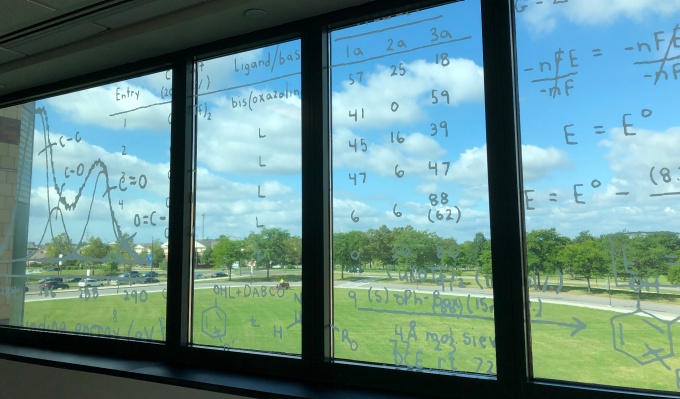Department of Chemistry By The Numbers

• $5.3 Million Research Expenditures
• 162 Graduate
• 235 Undergraduate
• 163 Publications in 2018
Who we are:
• 28 tenure-line faculty
• 3 lecturers
• 16 professional staff
• 11 postdoctoral researchers
• 162 graduate students (133 PhD, 29 master’s)
• 235 undergraduate majors in chemistry and medicinal chemistry
Teaching and training:
• Undergraduate enrollment, annually: >7,200
• Undergraduate credit hours taught: >34,000
• Degrees awarded, 2018-2019:
Bachelor’s: 82
Master’s: 16
PhD: 28
Research impact:
• Publications in 2018: 163
• Citations of articles published from 2011-2018: 25,970 or 23.3 per article
• Research expenditures:
$5.33M in FY2017 (an 11% increase from FY2016)
Curricular Innovation
Updates to Graduate Curriculum
Now more than ever, the Department of Chemistry's graduate program emphasizes student-centered education. The Department continues to offer Master's and PhD degrees in both Chemistry and Medicinal Chemistry. Following a recent review of our programs, we refined our requirements to allow increased freedom in selecting coursework. These policy changes enable students to tailor graduate curricula to align with their interests, without sacrificing the breadth that is requisite for a well-rounded education in Chemistry. We are also very pleased to report that the Master of Arts degree in Chemistry has been officially changed to Master of Science to reflect the fact that our program is a science - not art - based Chemistry degree.
Transforming the General Chemistry Curriculum
The Department of Chemistry has instituted sweeping changes to our general chemistry program! In fall 2018, we introduced CHE 110, Problem Solving for General Chemistry 1, a one-credit discussion course to augment firstsemester General Chemistry. CHE 110 is recommended for students with limited high-school backgrounds in chemistry. The course introduces problem-solving strategies and reiterates core concepts, promoting success in our overall general chemistry sequence. On the basis of students’ performance and feedback, the initial offering of CHE 110 was a resounding success. We are further refining this new course for 2019-2020. In winter 2019, Prof. Troy Wood taught the department’s first online general
chemistry course. Prof. Wood and Prof. Stacey Gulde developed the online course with funding from the UB EXCITE (Excellence in Course Instruction Through Enquiry) program. In fall 2019, our general chemistry laboratory and lecture/recitation portions of our general chemistry sequences were split into two separate courses, providing students with flexibility in scheduling their UB chemistry experience. Finally, in fall 2019, we unveiled a rejuvenated general chemistry laboratory curriculum featuring new and updated experiments and a new laboratory manual. Through these curricular reform efforts, we aim to modernize and enhance students’ UB chemistry experience, to maximize their likelihood of success, and to facilitate the continued expansion of enrollment in undergraduate chemistry courses.
Summer Science at UB
These specially-designed workshops prep students for first-year science coursework while building the “survival skills” incoming freshmen need to successfully navigate the transition from high school to a university setting. Make friends, meet professors, protect your STEM GPA, and have fun! The workshops include: Preparation for Evolutionary Biology, Preparation for General Chemistry, and Preparation for General Physics.